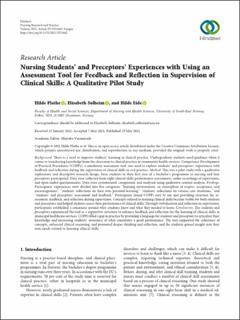| dc.contributor.author | Plathe, Hilde | |
| dc.contributor.author | Solheim, Elisabeth | |
| dc.contributor.author | Eide, Hilde | |
| dc.date.accessioned | 2021-06-17T11:04:04Z | |
| dc.date.available | 2021-06-17T11:04:04Z | |
| dc.date.created | 2021-06-08T16:02:17Z | |
| dc.date.issued | 2021 | |
| dc.identifier.citation | Plathe, H., Solheim, E., & Eide, H. (2021). Nursing Students’ and Preceptors’ Experiences with Using an Assessment Tool for Feedback and Reflection in Supervision of Clinical Skills: A Qualitative Pilot Study. Nursing research and practice, 2021. | en_US |
| dc.identifier.issn | 2090-1429 | |
| dc.identifier.uri | https://hdl.handle.net/11250/2759948 | |
| dc.description.abstract | Background: There is a need to improve students’ learning in clinical practice. Undergraduate students need guidance when it comes to transferring knowledge from the classroom to clinical practice in community health services. Competence Development of Practical Procedures (COPPs), a simulation assessment tool, was used to explore students’ and preceptors’ experiences with feedback and reflection during the supervision of clinical skills in real practice. Method: This was a pilot study with a qualitative exploratory and descriptive research design. Four students in their first year of a bachelor’s programme in nursing and four preceptors participated. Data were collected from eight clinical skills performance assessments, audio recordings of supervision, and open-ended questionnaires. Data were systematized, categorized, and analysed using qualitative content analysis. Findings: Participants’ experiences were divided into five categories: “learning environment, an atmosphere of respect, acceptance, and encouragement,” “students’ reflections on their own personal learning,” “students’ reflections on various care situations,” and “students’ and preceptors’ assessment and feedback.” Participants found COPPs easy to use and providing structure for assessment, feedback, and reflection during supervision. Concepts related to learning clinical skills became visible for both students and preceptors and helped students assess their performance of clinical skills. Through verbalization and reflection in supervision, participants established a consensus around what students knew and what they needed to learn. Conclusions: The students and preceptors experienced the tool as a supportive structure to enhance feedback and reflection for the learning of clinical skills in municipal healthcare services. COPPs filled a gap in practice by providing a language for students and preceptors to articulate their knowledge and increasing students’ awareness of what constitutes a good performance. The tool supported the coherence of concepts, enhanced clinical reasoning, and promoted deeper thinking and reflection, and the students gained insight into their own needs related to learning clinical skills. | en_US |
| dc.language.iso | eng | en_US |
| dc.rights | Navngivelse 4.0 Internasjonal | * |
| dc.rights.uri | http://creativecommons.org/licenses/by/4.0/deed.no | * |
| dc.title | Nursing Students’ and Preceptors’ Experiences with Using an Assessment Tool for Feedback and Reflection in Supervision of Clinical Skills: A Qualitative Pilot Study | en_US |
| dc.type | Journal article | en_US |
| dc.type | Peer reviewed | en_US |
| dc.description.version | publishedVersion | en_US |
| dc.rights.holder | © The Author(s) 2021. | en_US |
| dc.source.volume | 2021 | en_US |
| dc.source.journal | Nursing Research and Practice | en_US |
| dc.identifier.doi | https://doi.org/10.1155/2021/555166 | |
| dc.identifier.cristin | 1914628 | |
| cristin.ispublished | true | |
| cristin.fulltext | original | |
| cristin.qualitycode | 1 | |

